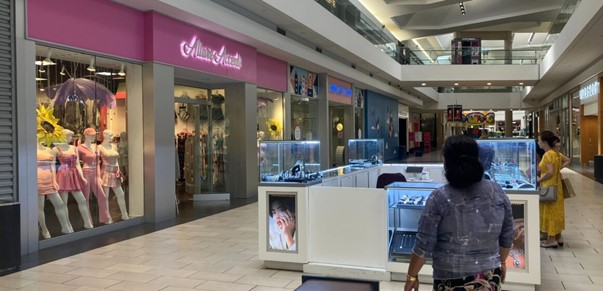by Vicente Vera
September 10, 2024
https://sanjosespotlight.com/san-jose-leaders-push-proposition-36-as-critics-fight-back/
Allure Accents, a clothing store for women in Eastridge Center, experienced thefts two weeks after opening, the manager said. Photo by Vicente Vera.
A coalition of elected officials that Gov. Gavin Newsom dismissed as “just a couple mayors,” is raising hundreds of thousands of dollars in an effort to reverse lenient rules on retail and drug crimes.
San Jose Mayor Matt Mahan announced the “Yes on 36” ballot measure committee with Elk Grove Mayor Bobbie Singh-Allen and Sacramento County District Attorney Thien Ho on Aug. 14 to call for tighter laws and jail sentences on retail theft and drug crimes. But supporters of the criminal justice reforms that 2014’s Proposition 47 brought to California, said Proposition 36 will only increase the jail population and roll back funds for mental health and drug treatment programs.
Silicon Valley De-Bug founder Raj Jayadev said Proposition 36 would only ensure mass incarceration and expansion of prisons.
“Prop 36 turns back the clock to a time of failed law on drug policies, racialized criminalization of communities of color and poor people, and in the most practical ways,” Jayadev told San José Spotlight. “It is designed to incarcerate vulnerable people.”
If California voters pass Proposition 36 on the Nov. 5 ballot, the total prison population could increase by a few thousand people, according to the Legislative Analyst’s Office. About 90,000 people are incarcerated across the state.
Known as the Increase Drug and Theft Penalties and Reduce Homelessness Initiative, Proposition 36 would bring back felony charges for thefts of money or property worth less than $950, along with felony charges for people possessing fentanyl.
South Bay leaders including Mahan, Milpitas Mayor Carmen Montano and Palo Alto Councilmember Lydia Kou continue to tout Proposition 36 as the solution to increasing homelessness and businesses closing because of crime.
Montano told San José Spotlight she thinks a majority of Californians were misled into voting for Proposition 47 because the ballot measure’s supporters frequently referred to it as the “Safe Neighborhoods and Schools Act.”
“I’ve spoken to a few of our police officers, and when they respond to smash and grabs they can’t pursue the crime because their hands are tied since most of the thefts would be considered petty theft,” Montano told San José Spotlight. “That needs to change.”
Business owners and employees also have their hands tied when witnessing retail thefts, a manager of Eastridge Center women’s clothing store Allure Accents said.
“Retail theft has always been a problem, but we’re new, it’s our first year here and we experienced theft in just the first two weeks,” Heather, who withheld her last name in order to speak candidly about her experience, told San José Spotlight. “We can’t chase after them or anything. I’d be happy to see laws that find ways to minimize (retail theft), but it might be difficult to get them passed.”
The “Yes on 36, Common Sense for Safety” ballot measure committee has raised at least $573,000 in contributions since Aug. 19, according to state campaign finance filings.
The committee has since launched advertising campaigns on social media platforms such as Facebook, Instagram and X, formerly known as Twitter. Mahan said Proposition 36 is not just about addressing retail theft, but homelessness, mental health and drug treatment as well.
Under the proposed ballot measure, people charged with felony drug possession will have the option to seek treatment and wellness instead of incarceration.
And the state has the funds to make it happen, Mahan said.
“In a nearly $300 billion state budget, mass treatment is a question of political will, not financial capacity,” he told San José Spotlight. “The most expensive option is to maintain the status quo — we currently spend over $50,000 per year on each unhoused individual just to manage the symptoms of homelessness. Our justice system needs new tools to tackle this crisis, and as mayor, I know our residents are demanding real solutions.”



Recent Comments